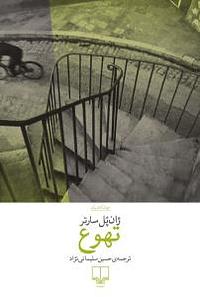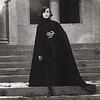Take a photo of a barcode or cover
challenging
reflective
medium-paced
Plot or Character Driven:
Character
Strong character development:
Yes
Loveable characters:
Yes
Diverse cast of characters:
Yes
Flaws of characters a main focus:
Complicated
Sartre’s Nausea is such a complicated novel to discuss - it is so layered and philosophical, that reading it just the once does not feel like enough to be able to review or discuss it. The novel can be viewed from so many different standpoints, be representative of so many things, and carry so many messages and meanings. Nausea fits perfectly among other existentialist fiction, such as Camus’ The Stranger, Kafka’s The Trial, and Dostoevsky’s Crime and Punishment, yet separates itself from these texts as it almost reads as an extended, fictionalised essay. Sartre deconstructs existence as we know it to such a great extent that the reader is left not just to think, but to process existence itself. As a novel, the first half drags, but it picks up immensely once Roquentin’s viewpoints and philosophy become more clearly defined.
challenging
reflective
medium-paced
Plot or Character Driven:
Character
Strong character development:
Yes
Loveable characters:
No
Diverse cast of characters:
No
Flaws of characters a main focus:
Yes
I really have to stop reading books without plots. The prose is excellently crafted and I was never bored but at no time did I feel engaged either. Probably I'm missing the point entirely.
dark
emotional
reflective
slow-paced
Plot or Character Driven:
Character
Strong character development:
Complicated
Loveable characters:
Complicated
Diverse cast of characters:
No
Flaws of characters a main focus:
Yes
Sartre delves into the nausea-inducing anxiety of existential crisis like a skillfully wielded oar in water. I can relate so much to his description of needing to commit every moment to memory and absorb it into one's being. I was impressed with his way of describing the inability of getting to any object or sensation's essence. He can never get to the record being played in the cafe because the record's physical presence is not its true self, its essence. This reminds me a lot of Socrates' super-table in [b:The Allegory of the Cave|7624251|The Allegory of the Cave|Plato|https://images.gr-assets.com/books/1308684987s/7624251.jpg|10107799] by Plato. As someone who loves writing and has always attempted to memorize the events in my life, I found Sartre's claim that stories are misleading in that they portray the life of the character as having been lived like a story, when it really had to have been lived, and then told as a story as a separate act, to be particularly insightful. One has to choose between living and story-telling. No story is perfect as it seems. It was lived imperfectly first.
Finally done with this. There were some passages that I really enjoyed, but wouldn't read it again. It's hard to decipher sartre's message if you're not familiar with his philosophy, however it's still a nice read.
“My thought is me: that's why I can't stop. I exist because I think...and I can't stop myself from thinking. At this very moment, it's frightful, if I exist, it is because I am horrified at existing. I am the one who pulls myself from the nothingness to which I aspire: the hatred, the disgust of existing, there are as many ways to make myself exist, to thrust myself into existence. Thoughts are born at the back of me, like sudden giddiness, I feel them being born behind my head...if I yield, they're going to come round in front of me, between my eyes, and I always yield, the thought grows and grows and there it is, immense, filling me completely and renewing my existence”
The unreality of that verdant blossoming of things, of strata, hew, form, shape and structure, all intractable and present. For Sartre, that rapping on the fatal door of destiny comes in the disillusionment of words, facades and movements, all transitory and exigent upon the need to justify our powerlessness in the field and concept of time. That nausea is the disintegration of that delicate unity of things; peeling back the adornment to contemplate the void. Fascinating thinker, I’m excited to read more of his work.
The unreality of that verdant blossoming of things, of strata, hew, form, shape and structure, all intractable and present. For Sartre, that rapping on the fatal door of destiny comes in the disillusionment of words, facades and movements, all transitory and exigent upon the need to justify our powerlessness in the field and concept of time. That nausea is the disintegration of that delicate unity of things; peeling back the adornment to contemplate the void. Fascinating thinker, I’m excited to read more of his work.
Walging (La Nausée) van Jean-Paul Sartre uit 1938. Dit is een apart boek dat voornamelijk zich focust op de filosofie van Satre, zijn existentialisme. Dit word gedaan in een roman vorm, wat het enerzijds heel toegankelijk maakt, maar anderzijds blijft een beetje kennis over zijn filosofie nodig om het boek echt te kunnen begrijpen. In het boek volgen we Antoine Roquentin die in een denkbeeldige stad in Frankrijk woont. Zijn leven als historicus volgen mij terwijl wij tegelijkertijd regelmatig met enkele filosofische vragen worden geconfronteerd, wat is het zijn, is daar de voornaamste van. Verder werkt Satre het concept van walging uit. Wat dit precies inhoudt vind ik lastig te omschrijven, maar zoals het mij overkwam zijn wij gebonden aan onze eigen blik op de wereld, wij bieden bepaalde betekenissen en ideeën aan de wereld om het te kunnen begrijpen. Deze ideeën leggen wij wel zelf op en wij beperken onze visie op de wereld hiermee. Wij kunnen echter deze ideeën van ons af werpen en zo de wereld proberen te zien zoals die is (het idee huwelijk is iets dat wij zelf opleggen, maar ook hoe iemand leven er ongeveer uit behoort te zien, huisje, boompje, beestje). Verder kan deze walging ook de ervaring van vrijheid zijn in de hoeveelheid opties die wij hebben en dat wijzelf de enige zijn die ons beperken in iets te doen. De walging word ook geduid in het boek doordat het hoofdpersonage de hand beetpakt van een ander en dit realiseert als een homp vlees (de wereld zoals die is zonder ons concept van de hand). Het was een boeiend boek waar ik hoop eer aan te hebben gedaan en ik hoop dat jullie, mochten jullie geïnteresseerd zijn is een filosofische roman, deze oppakken.
https://youtu.be/RWjq9tDWA3o
https://youtu.be/RWjq9tDWA3o
This is a cautious recommendation for anyone who doesn't feel the urge to finish books they begin. I didn't expect to like this quite as much as I did until I was past the half-way point. Sartre essentially spends 70 pages doing what Camus did in the opening line of L'Etranger, which is certainly one reason why that line is so famous. It's agonizing reading the boring thoughts of a listless, barely alive affluent vagabond, but at least that tedium is for something. The first half of the book is hugely flawed, but the book just manages to get beyond it and say some interesting things anyway.
As an Existentialist work, this is probably one of the best starting points one could hope for, if you're the sort who can stomach the tedium. When the book is genuinely diving into Sartre's philosophy, it's good. He was definitely a better philosopher than a novelist. Roquentin is fairly insufferable, but one can glean some common human characteristics in him as the book progresses beyond 'I am not Jean-Paul Sartre but I am an ugly guy who inexplicably fucks.' That I found the writing somewhat painful may reflect on the diaristic mode - reading my own thoughts seem insufferable and banal, so Sartre is merely reflecting on the 'reality' of dull introspection.
The more I write, the more I'm inclined to think I wouldn't recommend this at all. It's a good summation of Sartre's 'existence-precedes-essence' idea, but I don't think it's so well-expressed here one must read the novel to understand the concept. Also, it annoyed me that the introduction spoke about major Existentialist thinkers and didn't mention Simone de Beauvoir once, not even as a Sartre-adjacent thinker. I'm inclined to think she was a better writer.
As an Existentialist work, this is probably one of the best starting points one could hope for, if you're the sort who can stomach the tedium. When the book is genuinely diving into Sartre's philosophy, it's good. He was definitely a better philosopher than a novelist. Roquentin is fairly insufferable, but one can glean some common human characteristics in him as the book progresses beyond 'I am not Jean-Paul Sartre but I am an ugly guy who inexplicably fucks.' That I found the writing somewhat painful may reflect on the diaristic mode - reading my own thoughts seem insufferable and banal, so Sartre is merely reflecting on the 'reality' of dull introspection.
The more I write, the more I'm inclined to think I wouldn't recommend this at all. It's a good summation of Sartre's 'existence-precedes-essence' idea, but I don't think it's so well-expressed here one must read the novel to understand the concept. Also, it annoyed me that the introduction spoke about major Existentialist thinkers and didn't mention Simone de Beauvoir once, not even as a Sartre-adjacent thinker. I'm inclined to think she was a better writer.
The Extraordinary Adventures of Antoine Roquentin
“There are no adventures.”
“There are no adventures.”
challenging
reflective
fast-paced
Plot or Character Driven:
Character
Strong character development:
Complicated
Loveable characters:
Complicated
Diverse cast of characters:
No
Flaws of characters a main focus:
Complicated




